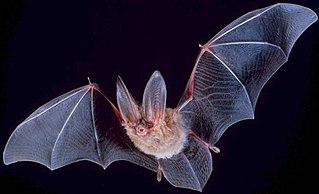
The brown long-eared bat or common long-eared bat is a small Eurasian insectivorous bat. It has distinctive ears, long and with a distinctive fold. It is extremely similar to the much rarer grey long-eared bat which was only validated as a distinct species in the 1960s. An adult brown long-eared bat has a body length of 4.5-4.8 cm, a tail of 4.1-4.6 cm, and a forearm length of 4-4.2 cm. The ears are 3.3-3.9 cm in length, and readily distinguish the long-eared bats from most other bat species. They are relatively slow flyers compared to other bat species.

The genus Plecotus consists of the long-eared bats. Many species in the genus have only been described and recognized in recent years.

The Alpine long-eared bat or mountain long-eared bat is a species of long-eared bat. It was originally described from Switzerland and Austria as a species intermediate between the brown long-eared bat and the grey long-eared bat in 1965. It was later described in 2002, from France and Austria, respectively. Despite its name, this species is not restricted to the Alps, being found in Croatia, Bosnia and Herzegovina and elsewhere. It differs from other European long-eared bats, such as the brown long-eared bat, by its white underparts.

The genus Corynorhinus consists of the big-eared bats, or American long-eared bats. Only three species occur in the genus, all occurring in North America. Members of this group were previously in the genus Plecotus, the long-eared bats, and were also then called lump-nosed bats. Populations of these species are generally uncommon and declining. Two subspecies, the Virginia big-eared bat and the Ozark big-eared bat are federally endangered.

The grey long-eared bat is a fairly large European bat. It has distinctive ears, long and with a distinctive fold. It hunts above woodland, often by day, and mostly for moths. In captivity, it has also been recorded to eat small lizards. It is extremely similar to the more common brown long-eared bat, and was only distinguished in the 1960s, but has a paler belly.
The Ethiopian big-eared bat or Ethiopian long-eared bat is a recently described species of long-eared bat in the family Vespertilionidae.
Christie's big-eared bat, also known as the Egyptian long-eared bat or gray long-eared bat, is a species of vesper bat in the family Vespertilionidae. It is endemic to Egypt. Its natural habitats are subtropical or tropical dry shrubland, rocky areas, and hot deserts.

Rafinesque's big-eared bat, sometimes known as the southeastern big-eared bat, is a species of vesper bat native to the southeastern United States.

The Canary big-eared bat, also known as the Tenerife long-eared bat is a species of vesper bat endemic to the Canary Islands. According to the IUCN, it is vulnerable to the risk of extinction. The species is primarily found in woodland habitat at elevations between 100 and 2300 m. It feeds mainly on moths. Roosting sites include caves, lava tubes and abandoned buildings.

Townsend's big-eared bat is a species of vesper bat.

The Vespertilioninae are a subfamily of vesper bats from the family Vespertilionidae.

The Sardinian long-eared bat is a species of bat endemic to Sardinia, Italy.
The Japanese long-eared bat is a species of vesper bat endemic to Japan, where it is found in Hokkaido, Honshu and Shikoku. It has distinctive, long ears, hence its Japanese name, the 'rabbit bat'. Formerly included as a subspecies of the European bat Plecotus auritus, genetic studies now indicate Plecotus sacrimontis is a separate species.

Kolombatovic's long-eared bat, also known as the Mediterranean long-eared bat, is a European species of bat found in the Balkans.
Ognev's long-eared bat is a species of bat found in Asia. By 2006, it was recognized as a separate species from the P. auritus species complex.
Plecotus gaisleri, also known as Gaisler's long-eared bat, is a species of bat in the genus Plecotus. It is medium-sized grayish-brown and found in Morocco, Algeria, Libya, and Tunisia.
Plecotus homochrous, commonly called Hodgson's long-eared bat, is a species of bat in the family Vespertilionidae. It is endemic to the Indian subcontinent.









